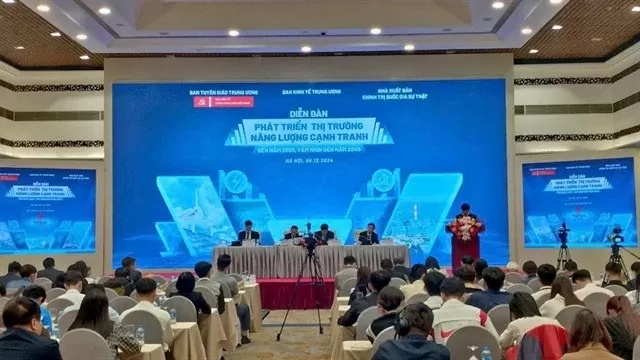
Several critical challenges facing the country’s energy sector: experts
Latest
 |
| At the conference. (Source: VNA) |
This vision was the focus of a conference late last week in Hanoi discussing the development of a competitive energy market by 2030, with a vision to 2045.
Economists, industry experts and policymakers at the event highlighted several critical challenges facing the country’s energy sector and the urgent need for strategic reforms.
Key issues include the transition to net-zero emissions, potential energy shortages, limited diversification of energy sources, inadequate planning and complex pricing policies. These factors pose significant threats to Vietnam’s energy security.
Participants underscored the necessity of addressing these challenges to ensure rapid and sustainable energy development while aligning with goals of ecological preservation, national defence and social equity.
Professor Tran Dinh Thien, former director of the Vietnam Institute of Economics, emphasised the importance of modernising the country’s energy market. He called for a clear delineation of the roles of the Government and the market, while bringing electricity prices closer to market realities.
He recommended promptly implementing a two-component pricing mechanism for electricity and seasonal price adjustments to enhance fairness and efficiency.
Pham Thi Thanh Binh, a lecturer at the Hanoi Open University, suggested Vietnam draw inspiration from global success stories.
For example, Taiwan (China)'s Renewable Energy Development Act has driven growth in renewable energy by reducing reliance on finite resources and lowering carbon emissions. Bình advocated adopting similar policies in Vietnam, such as transitioning to a bidding system to attract foreign investors and selecting developers offering the most competitive renewable energy prices.
Policymakers stressed the critical role of media outlets in helping the public access unbiased information on the country’s energy pricing policies and in combating misinformation. They highlighted the need for clear and transparent communication with the public to ensure fairness and build trust in the Government’s energy strategies.
Industry experts reiterated that developing a competitive energy market is essential to Vietnam’s socio-economic aspirations. Such an approach requires greater transparency, diversity and competitiveness.
Le Anh Chien, a representative of the Vietnam Oil and Gas Group (Petrovietnam), affirmed the group’s commitment to achieving the country’s energy objectives. Over recent decades, Petrovietnam has prioritised optimising domestic resources, adopting energy-saving measures and modernising transmission networks.
Under a plan to develop Vietnam’s energy market by 2030 with a vision to 2045, the Government has emphasised the importance of creating a competitive energy market. This strategy aims to ensure national energy security, support economic growth and foster international integration.

























